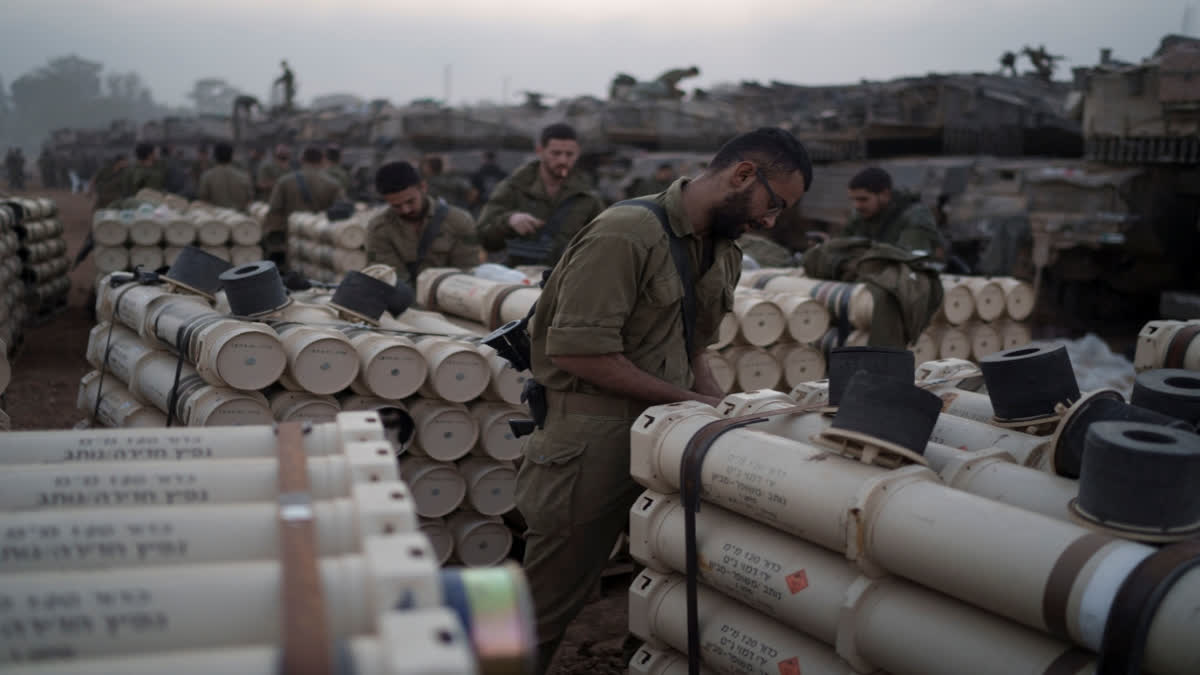Deir Al-Balah (Gaza Strip): Heavy fighting was reported in the southern Gaza city of Khan Younis on Tuesday, a day after Israel said it was withdrawing thousands of troops from other areas in a potential shift away from the massive air and ground operations that have devastated the Hamas-ruled enclave. Israeli Prime Minister Benjamin Netanyahu has vowed to press ahead with the war until Hamas is crushed and the more than 100 hostages still held by the militant group in Gaza are freed, saying it could take several more months.
But ahead of a visit to the region by U.S. Secretary of State Antony Blinken, Israel is under growing international pressure to scale back the offensive that has killed nearly 22,000 Palestinians. Blinken has urged Israel to do more to protect Palestinian civilians. Word of the troop drawdown came as Israel's Supreme Court struck down a key component of Netanyahu's contentious judicial overhaul plan, which had deeply divided Israelis and threatened the military's readiness before the Oct. 7 Hamas attack that triggered the war.
The ruling appeared to have dealt a fatal blow to the judicial plan. Netanyahu and his allies seem unlikely to revive the divisive initiative during wartime. Elections are widely expected once the fighting winds down, and widespread anger in Israel over intelligence and security failures linked to the Hamas attack could translate into a poor showing for those in power now.
The court ruling could meanwhile help Israel fend off allegations of genocide in Gaza made by South Africa at the International Court of Justice. The ICJ and other international tribunals consider whether countries have their own independent judiciaries in deciding on whether to intervene.
TROOPS ROTATE OUT BUT COMBAT CONTINUES
The army said Monday that five brigades, or several thousand troops, would be taken out of Gaza in the coming weeks. Some will head to bases for further training or rest, while many older reservists will go home. The war has taken a toll on the economy by preventing reservists from going to their jobs, running their businesses or returning to university studies.
The military has not said publicly whether the withdrawal reflects a new phase of the war. But the move is in line with the plans that Israeli leaders have outlined for a low-intensity campaign that focuses on remaining Hamas strongholds and could last for much of the year. Israel has said it's close to operational control over most of northern Gaza, reducing the need for forces there. Yet fierce fighting has continued in other areas of the Palestinian territory, especially the south, where many of Hamas' forces remain intact and where most of Gaza's 2.3 million people have fled.
Meanwhile, Defense Minister Yoav Gallant announced late Monday that residents from seven Israeli communities close to Gaza can return to their homes soon, one of the most concrete signs that the army feels confident it has minimized the threat of rocket launches from parts of Gaza. The communities are located 4 to 7 kilometers (2.5 to 4.5 miles) from the border.
Palestinians reported heavy airstrikes and artillery shelling overnight and into Tuesday in the southern city of Khan Younis and farming areas to the east, near the border with Israel. Fighting was also underway in and around the built-up Bureij refugee camp in central Gaza. Even in Gaza City, which has been largely depopulated and where Israeli ground troops have been battling militants for over two months, residents said there were clashes in different neighborhoods, as well as in the nearby urban Jabaliya refugee camp.
The war was sparked by the militant group's Oct. 7 attack on southern Israel, in which 1,200 people were killed and 240 others were taken hostage. Israel responded with an air, ground and sea offensive that has killed more than 21,900 people in Gaza, two-thirds of them women and children, according to the Health Ministry in the Hamas-ruled territory. The count does not differentiate between civilians and combatants in its count. The Israeli military says 173 soldiers have died since it launched its ground operation.
Israel says, without providing evidence, that more than 8,000 militants have been killed. It blames Hamas for the high civilian death toll, saying the militants embed within residential areas, including schools and hospitals. The war has displaced some 85% of Gaza's population, forcing hundreds of thousands of people into overcrowded shelters or teeming tent camps in Israeli-designated safe areas that the military has nevertheless bombed. Palestinians are left with a sense that nowhere is safe.
RULING COULD HELP ISRAEL FEND OFF GENOCIDE CHARGES
The widespread death and destruction unprecedented in the century-old Mideast conflict led South Africa to file a case against Israel at the ICJ, accusing it of genocidal" acts that aim to destroy Palestinians in Gaza. Israel rejected the accusations, calling them a blood libel. South Africa asked The Hague-based court last week to issue an interim order for Israel to immediately suspend its military operations in Gaza. The case, if it goes ahead, will take years, but an interim order could be issued within weeks.
It's unclear what concrete effects an ICJ ruling against Israel would have, but it would likely isolate the country politically and economically. Israel can't afford to ignore this, said Barak Medina, a law professor at the Hebrew University of Jerusalem. He said the Supreme Court ruling against the judicial overhaul could strengthen Israel's case by showing it has an active and independent court that can hold the government accountable.
The judicial overhaul itself, meanwhile, appears to have been defeated. Medina said the Supreme Court's decision to strike down a key plank of the proposed changes makes it unlikely courts would allow the others. Netanyahu's coalition could propose a watered-down version, but it would have to be passed by parliament, a process that would reopen deep divisions within Israeli society and generate even more anger at the prime minister, already blamed by many for the failure to prevent the Oct. 7 attack.
Read More



